 Petzlover
Petzlover Griffon Fauve de Bretagne is originated from France but Jack Russell Terrier is originated from United Kingdom. Griffon Fauve de Bretagne may grow 18 cm / 8 inches higher than Jack Russell Terrier. Griffon Fauve de Bretagne may weigh 13 kg / 29 pounds more than Jack Russell Terrier. Griffon Fauve de Bretagne may live 3 years less than Jack Russell Terrier. Both Griffon Fauve de Bretagne and Jack Russell Terrier has almost same litter size. Griffon Fauve de Bretagne requires Moderate Maintenance. But Jack Russell Terrier requires Low Maintenance
Griffon Fauve de Bretagne is originated from France but Jack Russell Terrier is originated from United Kingdom. Griffon Fauve de Bretagne may grow 18 cm / 8 inches higher than Jack Russell Terrier. Griffon Fauve de Bretagne may weigh 13 kg / 29 pounds more than Jack Russell Terrier. Griffon Fauve de Bretagne may live 3 years less than Jack Russell Terrier. Both Griffon Fauve de Bretagne and Jack Russell Terrier has almost same litter size. Griffon Fauve de Bretagne requires Moderate Maintenance. But Jack Russell Terrier requires Low Maintenance
 The Griffon Fauve de Bretagne is one of the oldest scenthounds in France and has always been part of a pack when hunting wolves and wild boar.
The Griffon Fauve de Bretagne is one of the oldest scenthounds in France and has always been part of a pack when hunting wolves and wild boar.
Once wolves started dying out in the 19th century and the dogs were no longer needed, they nearly became extinct. Luckily in 1949, Marcel Pambrun founded the Club de Fauve de Bretagne to bring the breed back from extinction.
Hailing from France, the dog is still used as a hunting dog in the country but is considered rare outside of Europe.
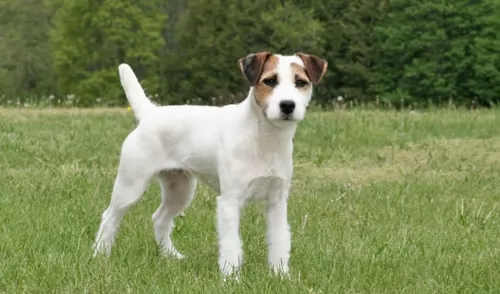 The popular Jack Russell Terrier was developed in Devonshire in the south of England in the late 1800's so as to hunt foxes.
The popular Jack Russell Terrier was developed in Devonshire in the south of England in the late 1800's so as to hunt foxes.
Often believed to be the Parson Russell Terrier, the Jack Russell Terrier was developed by Parson John Russell. This is where the dog gets his breed name from. Some people get the Jack Russell Terrier a little bit mixed up with the Parson Russell terrier, when it fact its actually a different breed, but sharing a common ancestry.
The Jack Russell Terrier is smaller than the Parson and bigger than the Russell Terrier. The breed became known in the U.S. by the 1930s and the Jack Russell Terrier Association of America wanted recognition by the American Kennel Club, which was granted in 2000.
 Griffon Fauve de Bretagne are medium-sized muscular dogs standing at between 48 to 56cm and weighing in the region of 17 to 21 kg.
Griffon Fauve de Bretagne are medium-sized muscular dogs standing at between 48 to 56cm and weighing in the region of 17 to 21 kg.
The fur of this dog is a tawny, golden, orange shade and is shaggy and coarse, being longer around the face. Known also as the Fawn Brittany Griffon, this scenthound has floppy ears and a long tail carried somewhat up and in a slight curve.
The GFB as he is also sometimes known by, is an affectionate and loyal dog that loves spending time with his human family.
He is a social, friendly dog, and when he is socialized and trained, he becomes even more amicable. He has been bred as a working dog and while he loves to spend relaxing hours indoors, he is essentially a dog that loves to be out and about chasing after prey.
He is alert and intelligent and therefore makes a good watchdog. Your Griffon is energetic and active and will require lots of exercise. He will love coming on walks with you, but this won't be enough and he will require ball- and rope games as well as the chance to join you on your jogging or cycling outings.
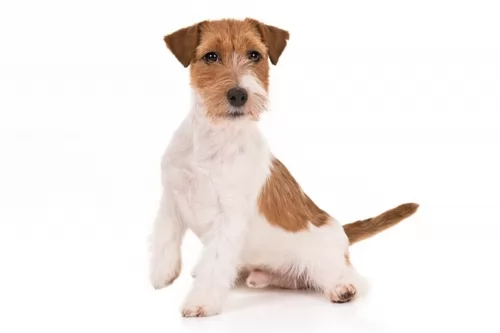 The Jack Russell Terrier is a small dog that weighs between 6 and 8kg and stands at between 25 – 38cm. The body length of the dog should be in proportion to the height.
The Jack Russell Terrier is a small dog that weighs between 6 and 8kg and stands at between 25 – 38cm. The body length of the dog should be in proportion to the height.
He is essentially a white dog with orange or fawn colored patches. The coat is mostly smooth and short, but the coat can also be longer and rough or it can be broken which is a combination of rough and smooth. Regardless of coat type, they are dense, double coats which will require brushing at least twice a week to remove loose hairs. He may also be tri-colored such as being white with black and tan patches.
He has alert, bright dark brown eyes and ears which are somewhat erect and which flop over at the tips. The tail has always been traditionally docked, giving him an attractive, compact look about him but unfortunately the tail is often left long on the dog these days.
Your Jack Russell Terrier is a lively, tenacious, bold, fearless, feisty, cheeky, confident, independent, intelligent and full of life dog. He is super energetic and exuberant, spirited and full of personality.
There are some dog owners who are exhausted by him and would prefer a more quieter dog breed as their companion. Nonetheless he has some excellent characteristics such as being a totally devoted and loving dog.
It is why it is a good idea to have him trained and socialized as it calms him down and makes him more obedient. He is very intelligent and training him will be easy.
 You won't find a better canine friend than the Griffon Fauve de Bretagne, once known as the Grand Fauve de Bretagne.
You won't find a better canine friend than the Griffon Fauve de Bretagne, once known as the Grand Fauve de Bretagne.
They have always loved their role as working- and hunting dog but when they're in the company of their human owners, they are loyal and loving, wanting to please.
This good nature of theirs sees them getting on well with other pets in the home as well as with children.Your golden Griffon Fauve De Bretagne is such a friendly, sociable dog and this is what makes him such a popular and sought after family pet.
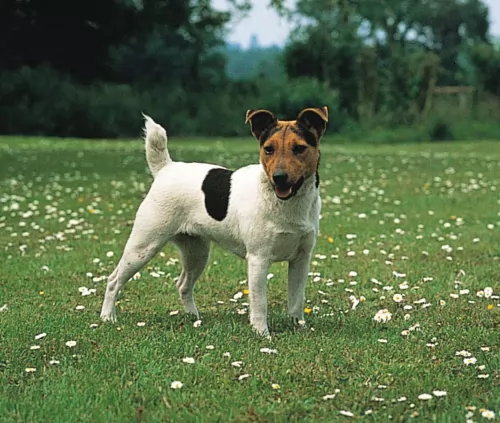 With loads of vibrant personality, the energetic Jack Russell Terrier has got so many wonderful characteristics to his name – devotion, intelligence, charming, lively, playful and he is an entertainer – you’ll always be laughing a him.
With loads of vibrant personality, the energetic Jack Russell Terrier has got so many wonderful characteristics to his name – devotion, intelligence, charming, lively, playful and he is an entertainer – you’ll always be laughing a him.
You do need to pay him attention – you can’t just plonk him in your backyard and forget about him. He wants your love and attention and ignoring him can lead to problem behavior such as obsessive barking.
Give your Jack Russell Terrier all the love and care he needs, and you’ll have an exceptional pet and friend.
 Capable of reaching 10 to 13 years of age with good care, the Griffon Fauve de Bretagne isn't likely to cause you too much concern with dog illnesses, but there are those common dog illnesses that are worth knowing about because they affect so many dogs.
Capable of reaching 10 to 13 years of age with good care, the Griffon Fauve de Bretagne isn't likely to cause you too much concern with dog illnesses, but there are those common dog illnesses that are worth knowing about because they affect so many dogs.
This is such a common dog ailment that it requires mentioning every time. It's a condition where the hip joint bones don't fit properly, resulting in unnatural wear and tear which ultimately leads to pain and arthritis.
Sometimes it takes a while for the illness to become evident and you'll notice your pet being loathe to take part in the games he loves so much or battling to get up after lying down. It can start in a young dog and will require vet intervention.
Keep an eye on your dog for other common illnesses such as eye diseases, skin allergies and bloat, a disease which can be life-threatening and where the stomach of your dog swells up.
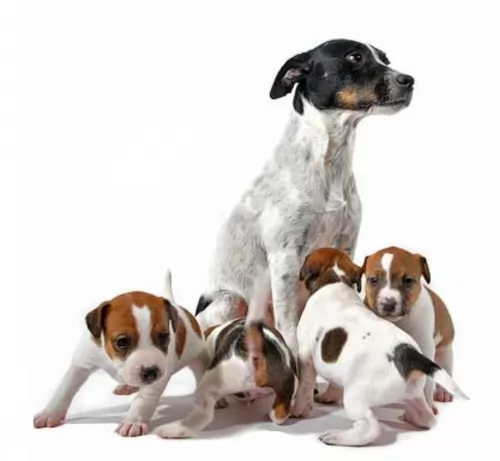 This particular dog breed has a reputation for being healthy and living to a good age such as 16 or 17 years of age. Of course he needs to be given proper care to reach such a good age.
This particular dog breed has a reputation for being healthy and living to a good age such as 16 or 17 years of age. Of course he needs to be given proper care to reach such a good age.
Some common dog disorders you might want to be aware of are -
Lens luxation is actually a common hereditary disorder in these dogs, but even so, with good care, your dog isn’t likely to battle with it. What happens is that the lens in the eye becomes displaced. There are two types, with Posterior luxation being the lesser severe one.Treatment is available.
Patellar luxation is an hereditary disorder affecting the knees of the dog. The kneecap slips off the groove where it sits and you may notice your dog running while holding his hind leg in the air. It can sometimes slip back in place and then you see your dog running in his usual way. It becomes more serious when it affects both legs.
 Your GFB, with his shaggy coat, will need a brush a couple of times a week and nothing much more, being looked upon as a fairly low maintenance breed.
Your GFB, with his shaggy coat, will need a brush a couple of times a week and nothing much more, being looked upon as a fairly low maintenance breed.
He will require you checking inside his ears to ensure he is free of infection. You will need to have his nails trimmed if he doesn't wear them down himself and he will need to have his teeth brushed at least 2 or 3 times a week with special dog toothpaste- and toothbrush.
As a medium sized dog, the Griffon Fauve de Bretagne will need a high-quality dog food full of all the right vitamins and minerals to ensure health and a long life.
He is a hunting dog so you want to make sure that protein is listed high on the ingredients list of his food packaging. You can vary his diet by adding in homemade fare such as cooked chicken, rice and vegetables and you can also try to include some raw meat into his diet too. This raw meat plays an important role in preventing skin allergies.
Never leave him without a bowl of fresh, cool water.
Ensure your 4-legged friend has a nice dry, warm spot with clean blankets to sleep on.
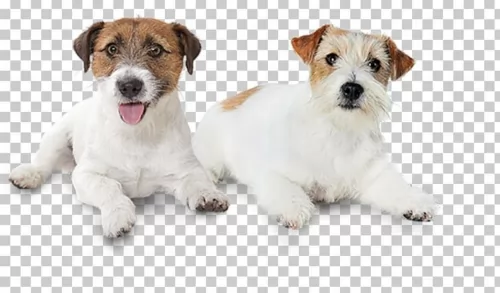 The Jack Russell Terrier isn’t just a small dog that can be left to his own devices. He will need proper training and socialization early in life to make him obedient and better to get on with.
The Jack Russell Terrier isn’t just a small dog that can be left to his own devices. He will need proper training and socialization early in life to make him obedient and better to get on with.
He may be a small dog, but he certainly won’t do in the city where he is cooped up in a place with a handkerchief of a garden. He needs lots of space to run and play. He wants his human family to join in with walks, hikes, ball games and swimming.
You can buy excellent commercially manufactured dog food which caters for energetic small dog breeds like the Jack Russell Terrier.
Once you have selected the best one for your pet, with dry kibble being better in terms of dental health - you can also add in some brown rice, vegetables and cooked chicken. This is highly beneficial to all dog breeds. A little bit of raw meat can sometimes be added in too.
The bottom line is to to prevent your pet from eating foods high in preservatives, additives and fillers. Never leave your pet without a constant supply of fresh, cool water.